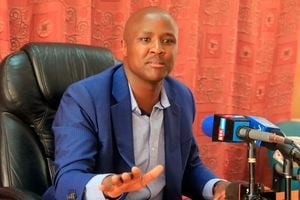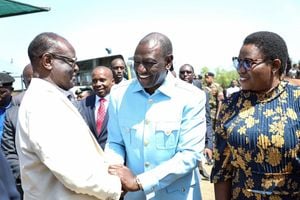Put a stop to our spendthrift ways which can easily bankrupt Kenya
When I meet Maragua MP Elias Mbau at the spot in Thika where I occasionally bumb into him, I’ll insist on buying him a drink.
Kudos to him and his Parliamentary Budget committee for the marvelous job of slashing the government’s outrageous outlay for globetrotting.
The recommended chop will save the Exchequer Sh1.4 billion. It cuts across the board – ministries, Parliament and the Judiciary. Mr Mbau is thinking austerity, which nobody else in officialdom seems to do.
The foreign wanderlust exhibited by senior government employees is disgraceful. It ranges from the unnecessary (what was the point of the whole Judicial Service Commission – minus the Chief Justice – travelling to meet the Chief Justice of Hong Kong last month?) to the ridiculous (I am told a parliamentary committee visited Geneva last year partly to ascertain whether Alvaro contains any alcoholic content).
Apart from all these travelling delegations being costly (business class plane tickets, five star hotels, stellar per diems), they can also cause downright embarrassment.
Recently I read somewhere about some foreign governments complaining about Kenyan delegations tripping all over each other and being a protocol nuisance to their hosts.
Take a case where a Kenyan ministerial delegation is in a foreign capital on some official business. At the same time a parliamentary committee lands on some other self-appointed errand.
Simultaneously, commissioners from our electoral body or those from Mzalendo Kibunjia’s outfit surface on yet some other mission. It can all get pretty untidy for the hosts.
At a high-level gender meeting in New York last year, the Kenyan delegation was saddled with two squabbling heads who typically had been dispatched separately by each wing of the coalition government.
Besides having to put up with the scandal, the hosts had to wonder what was this broke country whose officials spend all their time traipsing the world. One hears a lot these days of the cliché that “democracy is expensive.”
Yet we look foolish when we bankrupt Wanjiku so as to pay for the extravagance and high living of so-called reformists. Sure, reform is all the rage. But it is coming with a lot of wastage.
The issue is not just the money; it is the total lack of prudence and sense of priorities. The Electoral Commission stands up to demand Sh41 billion (that’s Sh1,000 for every Kenyan).
The Judiciary chimes in with a demand for Sh18 billion. And must ministers have fresh flowers delivered to their offices every day, especially when they are not there and are roaming abroad?
Of particular note are the multiple constitutional commissions we have saddled ourselves with. It was a daft idea to let these bodies more or less set their own emoluments. I know of one or two such commissions which pay themselves Sh80,000 per member per sitting.
That amount can employ three policemen. I am not surprised that these Commissions have turned out to be populated by NGO types who are used to donor money and have brought along the bad habits of over-inflated budgets and dodgy accounting.
Assistant Minister Kilemi Mwiria recently published a laudable article of how our spendthrift ways will easily bankrupt the country. It has reached crisis level.
Somebody (the Kenya National Union of Teachers, perhaps?) must insist that budget planning be made a compulsory and examinable subject in all our schools!
And along the way we may want to install a brand new constitutional Commission on Cost-Cutting. It is imperative that every seeker of public office appreciates that money does not just materialise like heaven’s manna.
Parliament has become especially notorious for its extravagance. The alarming frequency of pompous committee sessions is driven by the fat sitting allowances MPs pay themselves.
And why the heck has every parliamentary report have to be written at a fancy coastal beach resort or an equally luxurious lodge in Naivasha? Can’t the minds of MPs function at all unless they are in those posh climes?
Parliament has plenty of meeting rooms where such work can be done. The government has limitless other facilities all over Nairobi to host such work – the School of Monetary Studies in Ruaraka, the KCB training school in Karen, name it.




